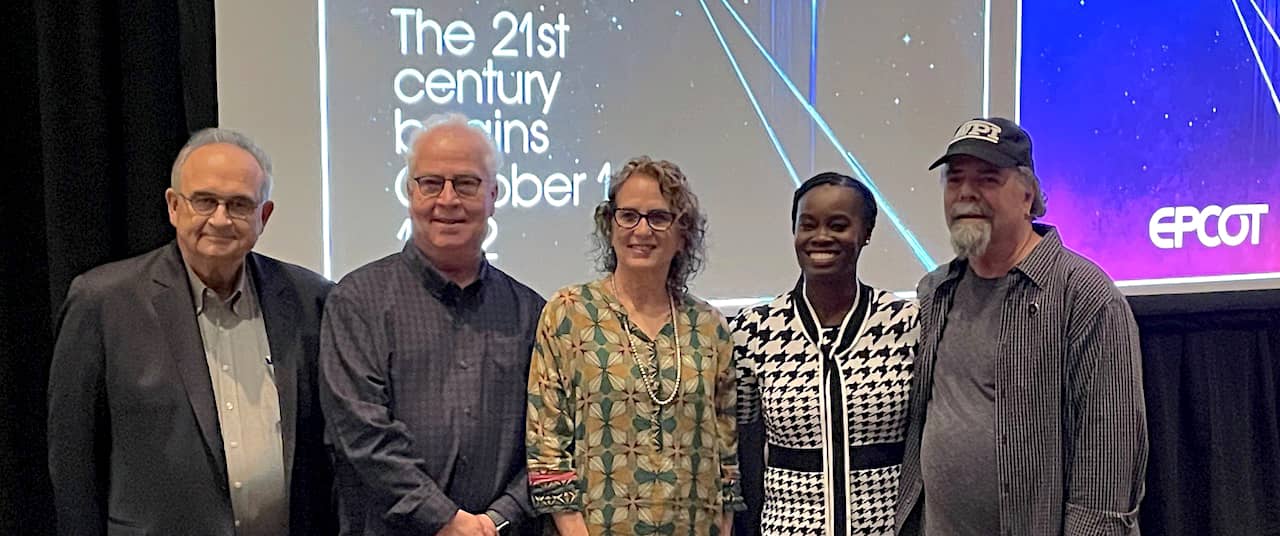For the 20th anniversary of Bob Rogers' Legends panel at the IAAPA Expo, Bob welcomed four Disney veterans to celebrate Epcot's 40th birthday. But like each past production of the Legends panel, the focus soon turned toward sharing lessons that anyone can use to become a more responsible, effective, and creative leader in the workplace.
Retiring Walt Disney Imagineering Global Ambassador Bob Weis opened the panel Wednesday afternoon with a tribute to the late Marty Sklar, who oversaw the development of Epcot.
"Epcot literally would not exist without Marty," Weis said. Marty left behind a treasure of more than 1,000 boxes of documents from the development of WDI projects around the world, a collection of more than two million documents that Weis called "the largest single, undiscovered archive company history." Weis is overseeing the curation of the Marty Sklar archives for WDI - one of the projects he is continuing after his retirement from Disney.
Epcot's legacy extends far beyond the attractions and restaurants that continue to welcome millions of visitors each year, however.
"It launched my career. It launched my company," Rogers said. "It launched a whole generation of companies that are out on that [IAAPA Expo] trade floor today. For Epcot, Rogers was the producer for Impressions de France as well as the post-show for the old World of Motion pavilion. Today, Rogers heads BRC Imagination Arts, which also recently celebrated its 40th anniversary.
Each participant on the panel - Rogers, Weis, Epcot Vice President Kartika Rodriguez, WDI Executive Portfolio Producer Jodi McLaughlin, and FAR Out! Creative Direction Founder & Chief Creative Officer and former Imagineer Rick Rothschild - has been responsible for leading teams in addition to their own creative and analytical work. So I leaned forward and paid extra attention when Rogers asked, "How do you drive creativity as a creative leader, as opposed to a creative talent?"

That question drove much of the rest of the discussion. Some of my favorite quotes from the panel follow.
"Walt Disney described this work as walking eight dogs," Weis said. "Just think about the image of having eight dogs on leashes - they're all different dogs, and they all want to go in all different directions, and Walt is in the center trying to move this mass of different personalities in a direction.
"We don't really work in didactic or directorial work. We are an intensely collaborative culture and every person has a unique personality and unique assets to bring. And your role is to try to channel that without cutting it off, without losing someone's amazing contribution."
"And then Walt occasionally allowed the eight dogs to take him in a direction that didn't think he was going to go," Rick said, drawing immediate agreement from Weis.
It's about "having the openness to let that go and trust in the collaboration," Weis said.
"You quickly learn the importance of surrounding yourself with folks [who] are very intelligent, with different backgrounds," Kartika said. "You don't need to be the smartest one in the room. And actually, if you are, you probably need to look for other people."
"Through that creativity - and creativity not in terms of a product, but in how people approach and think through things - that allows you to come up with something that's even bigger and better than you thought it would be," she said. "A lot of times in your career, when you are starting out, it's all about what you brought to the table, your ideas by itself. The more that you grow in your career, it's about the collective ideas that come together to meet the overall objective."
"It's that exposure to something different than you normally would do that helps you to think about something differently," she said. "The more you can do that and replicate that, the better you're gonna be able to solve these complex problems that we have to deal with - whether it comes to building something new [or] whether it's solving a problem that been there all along that you can't seem to fix it, because you keep going at it the same way."
"Bottom line, honesty in a leader makes life a whole lot easier," Rick said. "If it is hard to talk to somebody, but it needs to be said, then look to your leaders to say it in a way that you respect, but that you also appreciate and understand. When you don't get that from a leader, that's when it is really hard sometimes to continue to support a project or a process, or a leader."
"I would say clarity," Jodi added. "It's always challenging to try to second guess what someone who's asking you to do. I also think humor is really, really important. If you don't have a sense of humor, get one," she said to laughter from the standing-room-only crowd at the Orange County Convention Center.
"It breaks the ice, right? It gives people some space to just to maybe be themselves a little bit."
Rick compared the job of a creative leader to a bee, spreading pollen in the world.
"Epcot was the first one of those [projects] where, look at all those little bees that got released," he said. "Those bees are all over the place. Many are my friends, or your friends, or acquaintances that we work with, who have established incredible businesses."
There was much more to take from the discussion, of course. If you missed it or were not at the Expo, please enjoy our video of the complete Legends panel:
* * *
For more theme park news, please sign up for Theme Park Insider's weekly newsletter.
And to help support Theme Park Insider while saving money on discounted theme park tickets, please follow the ticket icon links our Theme Park listings page.
TweetThis article has been archived and is no longer accepting comments.
Ah, reminders of how Epcot was, a bit sad seemed to have lost some of that today.